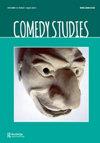Benign violations in the suburban ensemble dramedy
Q1 Arts and Humanities
引用次数: 1
Abstract
Abstract Peter McGraw and Caleb Warren’s benign violation theory (BVT) argues that humour is produced when three conditions are met: we perceive a situation as potentially violating, we perceive it also as benign, and the two perceptions occur simultaneously. This model is applied as a means to analyse comedy in screen media. BVT is motivated to describe the cognitive dissonances inherent to comedy spectatorship, and to perform hermeneutic readings of screen humour using a particular case study in dramedy cinema: the suburban ensemble film, including works such as The Kids Are All Right, Little Miss Sunshine and American Beauty. After surveying some of the key humorous stimuli recurrent across the genre, I then turn to other comedic texts that deal with family and domestic studies with a striking lack of pathos – in particular the cartoon series Family Guy. This comparison underscores an analysis of the ethics of benign violations in narrative media that is centred on the resolution of its fundamental affective dissonance, and the way this resolution might guide later critical thought. The article ultimately demonstrates the uses of BVT as a hermeneutic tool, and one that might help us isolate an ethics of comedy in media.郊区合奏剧中的善意侵犯
Peter McGraw和Caleb Warren的良性违背理论(BVT)认为,当满足三个条件时,幽默就会产生:我们认为一种情况可能是违反的,我们也认为它是良性的,这两种情况同时发生。该模型被用来作为分析银幕喜剧的手段。BVT的动机是描述喜剧观众固有的认知失调,并通过对喜剧电影的特定案例研究对屏幕幽默进行解释学解读:郊区合演电影,包括《孩子们都很好》、《阳光小小姐》和《美国丽人》等作品。在调查了这一类型中反复出现的一些关键的幽默刺激之后,我接着转向了其他一些处理家庭和家庭研究的喜剧文本,它们明显缺乏悲情——尤其是卡通片《恶搞之家》。这种比较强调了对叙事媒体中良性侵犯的伦理分析,该分析以解决其基本情感失调为中心,以及这种解决方式可能指导后来的批判性思维。这篇文章最终展示了BVT作为一种解释学工具的用途,它可以帮助我们在媒体中分离出喜剧伦理。
本文章由计算机程序翻译,如有差异,请以英文原文为准。
求助全文
约1分钟内获得全文
求助全文
来源期刊

Comedy Studies
Arts and Humanities-Literature and Literary Theory
CiteScore
0.60
自引率
0.00%
发文量
26
 求助内容:
求助内容: 应助结果提醒方式:
应助结果提醒方式:


